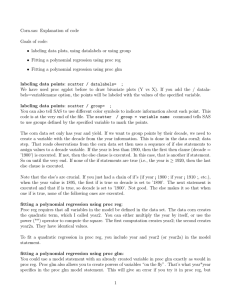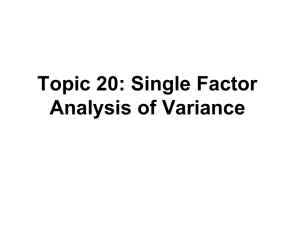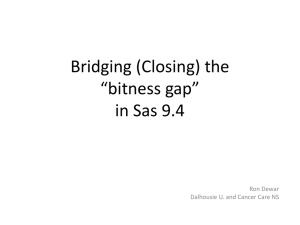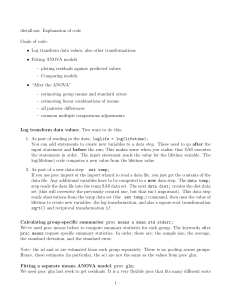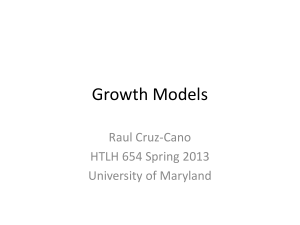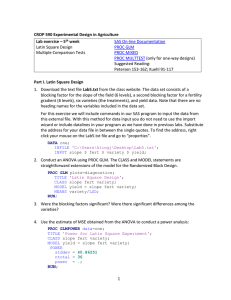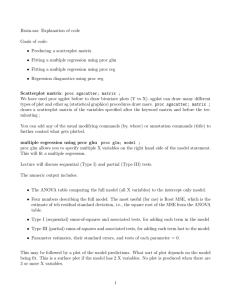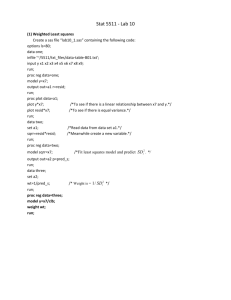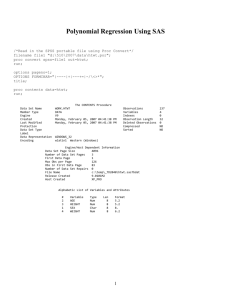Transformations - Crop and Soil Science
advertisement
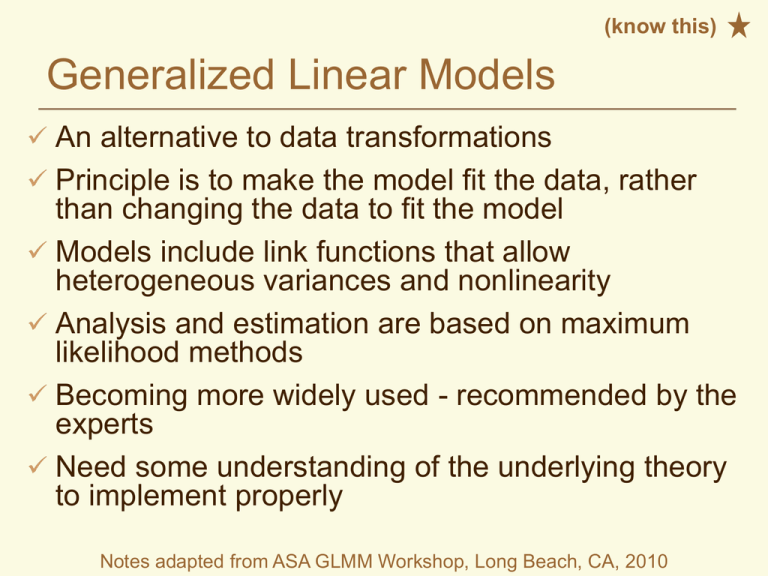
(know this) Generalized Linear Models An alternative to data transformations Principle is to make the model fit the data, rather than changing the data to fit the model Models include link functions that allow heterogeneous variances and nonlinearity Analysis and estimation are based on maximum likelihood methods Becoming more widely used - recommended by the experts Need some understanding of the underlying theory to implement properly Notes adapted from ASA GLMM Workshop, Long Beach, CA, 2010 Generalized Linear Models ANOVA/Regression model is fit to a non-normal data set Three elements: 1. Random component – a probability distribution for Yi from the exponential family of distributions (this is known) 2. Systematic component – represent the linear predictors (X variables) in the model i i Form is mean + trt effect No error term 3. Link function – links the random and systematic elements i g(i ) Log of Distribution = “Log-Likelihood” Binary responses (0 or 1) Probability of success follows a binomial distribution Y N Y N! NY NY P 1 P P 1 P Y! N Y ! Y N Y N Y log P 1 P Y N P Y log N log(1 P ) log 1 P Y “canonical parameter” Takes the form Y * function of P Example – logit link link log 1 µ can only vary from 0 to 1 can take on any value Use an inverse function to convert means to the original scale e 1 e Some Common Distributions & Link(s) Distribution Variable Type Mean Variance Common Link(s) Normal Continuous 2 Identity = Binomial Discrete proportion N(1 ) logit probit Poisson Discrete count =log() 2 log(), 1/ Exponential Continuous N (know this) RBD Mixed Model Analyses with SAS Distribution Treatments Fixed Blocks Fixed Treatments Fixed Blocks Random Normal (continuous) (PROC GLM) Linear Model (LM) (PROC MIXED) Linear Mixed Model (LMM) Non-normal (categories or counts) (PROC GENMOD) Generalized Linear Model (GLM) (PROC GLIMMIX) Generalized Linear Mixed Model (GLMM) Mixed Models - contain both random and fixed effects Note that PROC GLM will only handle LM! PROC GLIMMIX can handle all of the situations above (know this) Linear Models for an RBD in SAS Treatments fixed, Blocks fixed – PROC GLM (normal) or PROC GENMOD (non-normal) – all effects appear in model statement Model Response = Block Treatment; Treatments fixed, Blocks random – PROC MIXED (normal) or PROC GLIMMIX (non-normal) – Only fixed effects appear in model statement Model Response = Treatment; Random Block; GLIMMIX basic syntax for an RBD proc glimmix; class treatment block; model response = treatment / link=log s dist=poisson; random block; lsmeans treatment/ilink diff; fixed effects go in the model statement random effects go in the random statement default means and standard errors from lsmeans statement are on a log scale ilink option gives back-transformed means on original scale and estimates standard errors on original scale diff option requests significant tests between all possible pairs of treatments in the trial, (know this) Estimation in LMM, GLM, and GLMM Does not use Least Squares estimation Does not calculate Sums of Squares or Mean Squares Estimates are by Maximum Likelihood Output includes Source of variation degrees of freedom F tests and p-values Treatment means and standard errors Comparisons of means and standard errors
